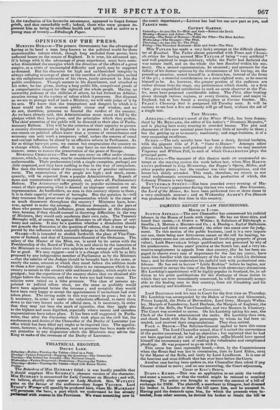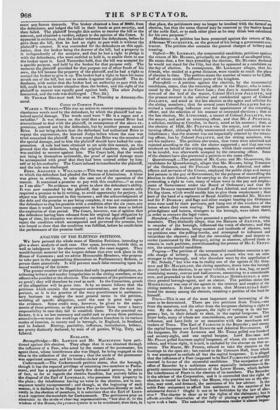DIqESTED REPORT OF LAW PROCEEDINGS.
HOUSE OF L CPUS.
SCOT CH APPEALS.—The new Chancellor has commenced his judicial labours in the House of Lords with vigour. He has sat three days, and heard four causes,—!. Greive v. Wilson ; 2. Solicitors of Edinburgh v. Smellie ; 3. Morton v. Hunters and Co.;4. Dunlop v. Earl of Dalhousie. The second and third were affirmed ; th other two stand over for judg- ment. To this section of the public business, (and it is a very import- ant one, there being now forty-seven causes on the roll for hearing, be- sides twentymore not yet set down, almost all involving property of great value), Lord BROTIGHAM brings qualifications not possessed by any of his predecessors. Seven years' practice at the Scotch bar, and a very ex- tensive employment in appeals from that country, (for he has been en- gaged in almost every case of importance for the last ten years), have made him familiar with the machinery of the law on which his decisions bear ; and he thereby undertakes his judicial task with professional con- fidence. He has not to borrow " Little Erskine" before he begins, nor have counsel to occupythe time of the House with elementary discussions. His Lordship's appointment will be highly popular in Scotland, for, in ad- dition to his great qualifications for the discharge of those duties frs which they are more immediately concerned, he will be personally accept- able to the leading men in that country, from old friendship and his great urbanity and kindliness.
COURT OF CHANCERY.
Lord BROuGHAm took his seat in Court for the first time on Tlmrsday. His Lordship was accompanied by the Dukes of Sussex and Gloucester, Prince Leopold, the Duke of Devonshire, Lord Grey, Marquis Welles- ley, Marquis of Lansdowne, Lord Durham, the Marquis of Anglesey, the Master of the Rolls, the Vice-Chancellor, and two Masters in Chancery. The Court was crowded to excess. On his Lordship taking his seat, the Clerk of the Crown administered the oaths. His Lordship then rose, and shook hands with the Noble personages by whom he had been at- tended, and received their congratulations. They then retired. PAGE v. Becosi.—The Solicitor-General applied to have this cause postponed. The Lord Chancellor stated, that if it suited the convenience of the parties concerned, he had no objection ; but regretted that he had not been apprized of the wish of [the parties, as3he [should have spared himself the unnecessary task of reading the voluminous and complicated pleadings. He was prepared to go on with it.
This cause has been repeatedly heard,—first, by the Commissioners when the great Seal was last in commission, then by Lord Eldon, next by the Master of the Rolls, and lastly by Lord Lyndhurst. It is one of the heaviest and most difficult that has ever been before the Court.
Another case having been spoken to, the Chancellor then asked if any Counsel wished to move; - and no one answering, the Court adjourned.
COURT OF KING'S BENCH.
EVANS v. Kr/Am.—This was an application to set aside the verdict and enter a nonsuit, or that the verdict might be reduced to nominal damages. The action was brought to recover the amount of a billof exchange for 21631. The plaintiff, a merchant in Glasgow, had directed his broker in London to draw the bill upon him, and he accepted 'it. Having paid the demands upon him, for which the proceeds were in- tended, from other sources, he desired his broker to retain the bill ,to meet any future demands. The broker obtained a loan of 30001. from the defendants, and lodged the bill in their hands as part security, and then failed. The plaintiff brought this action to recover the bill or the amount, and obtained a verdict, subject to the opinion of the Court. It appeared in evidence, that the broker informed the defendants, before he gave them the bill, that he had no right to part with it without the plaintiff's consent. It was contended for the defendants on this appli- cation, that the broker being the drawer of the bill, had a property in it independently of the acceptor, and that he had a right to pledge it with the defendants, who were entitled to hold it, to enable them to sue the broker upon it. Lord Tenterden held, that the bill was accepted for a specific purpose, and held by the broker for that purpose only. The moment the plaintiff provided for that purpose out of other funds of his own, the bill became the property of the plaintiff, and he had a right to compel the broker to give it up. The broker had a right to have his name struck out of the bill, but not to retain it against the plaintiff. The de- fendants, with notice that the broker had no authority to part with the bill, could be in no better situation than the broker, and the right of the plaintiff to recover was equally good against both. The other Judges concurred, and the rule was discharged. (Nov. 24.)
Sir THOMAS DENMAN took his seat on Thursday as Attorney-Ge- neral.
COURT OF COMMON PLEAS.
WARDE V. WEEws.—This was an action to recover compensation for slanderous words used by the defendant, by which the plaintiff had sus- tained special damage. The words used were " He is a rogue and a swiniller." It was shown on the trial that a person named Brier had discontinued to deal with the plaintiff, in consequence of the above ex- pressions, uttered not by the defendant, but by another person named Brice. It not being shown that the defendant had authorized Brice to repeat the expressions, the learned Judge before whom the case was tried nonsuited the plaintiff. It was urged that Brice was the occasion of the special damage, and to him the plaintiff should have looked for com- pensation. A rule had been obtained to set aside this nonsuit, on the ground that the defendant, being the original slanderer, the plaintiff was entitled to recover against him. The Court held, that the words not being in themselves actionable, the proof of special damage must he accompanied with proof that they had been uttered either by him- self or by his authority. The Court refused to interferefor the plaintiff, and the rule was discharged. EDEN, ASSIGNEE V. Witmams.—This was an action of assumpsit,
to which the defendant had pleaded the Statute of Limitations. A letter was given in evidence, to take the case out of the operation of the statute. It contained a promise to pay with this condition—" as soon as I am able." No evidence was given to show the defendant's ability. It was now contended by the plaintiff, that as the new statute only required a promise to be in writing, to avoid opportunity for perjury, its object was fully answered in this instance ; and the acknowledgment of the debt and the promise to pay being complete, it was not competent to the defendant to clog his promise with a condition after the six years, any more than it would have been competent to him to have done so before the expiration of that period. The Court, however, was of opiiiion that the defendant having been released from his original legal obligation by lapse of time, his situation was altered ; and that the plaintiff could not reject the condition which accompanied and governed the promise, but was bound to show that the condition was fulfilled, before he could claim the performance of the promise itself.



























 Previous page
Previous page